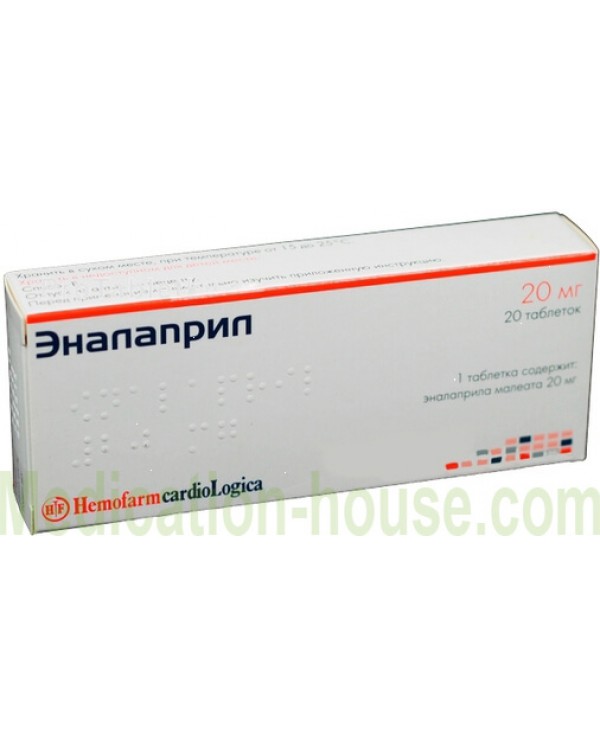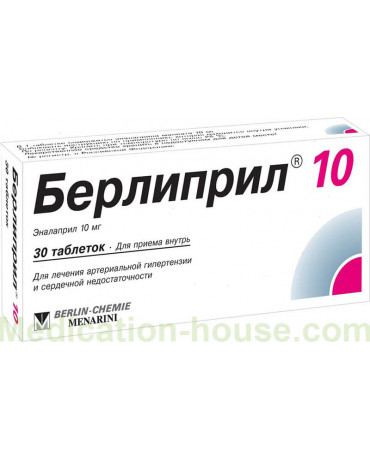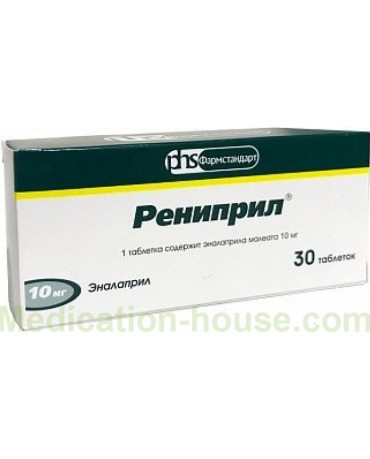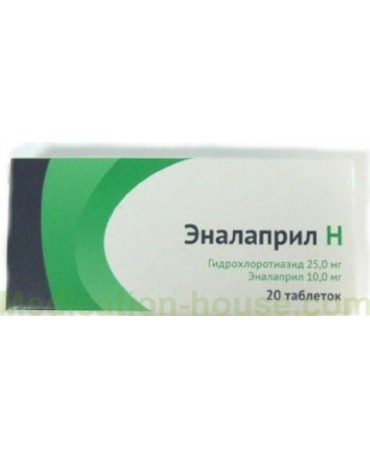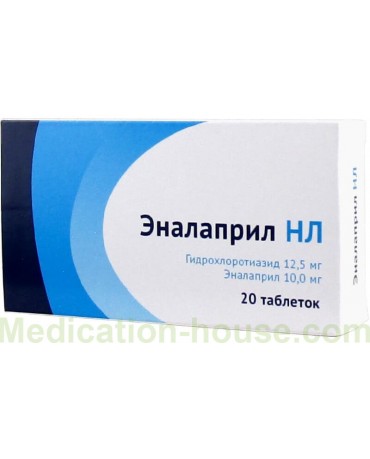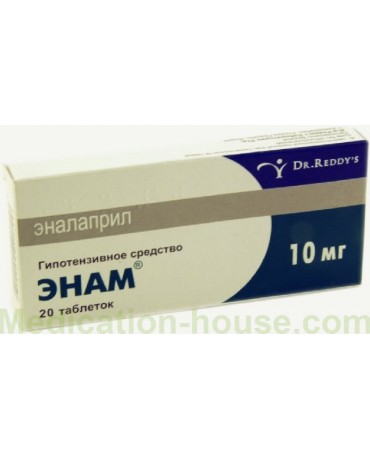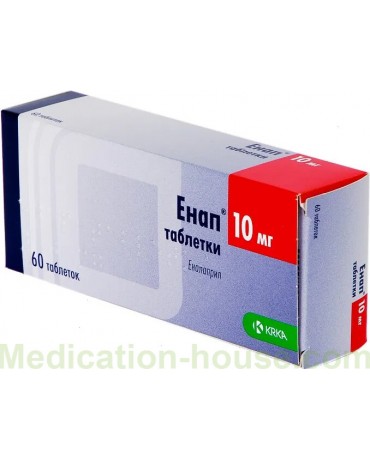Instruction for Enalapril
Reed more and buy Enalapril on this page
Pharmacological action
Enalapril is an angiotensin-converting enzyme inhibitor. Enalapril has a dilating effect on arteries and, to a lesser extent, on veins. The hypotensive effect of Enalapril is more pronounced with an increased concentration of renin in the blood plasma. When using Enalapril, renal and coronary blood flow improves. Long-term use of Enalapril reduces left ventricular hypertrophy of the myocardium and prevents the development of chronic heart failure. Enalapril has a stimulating effect on the blood supply to the myocardium. Reduces platelet aggregation. Enalapril is indicated for slowing the development of left ventricular dysfunction in patients with myocardial infarction. According to the reviews received, Enalapril has some diuretic effect.
Enalapril is a "prodrug" that hydrolyzes to form enalaprilat, which in turn inhibits the angiotensin-converting enzyme. The antihypertensive effect occurs 1 hour after taking Enalapril and lasts for 24 hours. Some patients need therapy for several weeks to achieve optimal blood pressure readings. Patients with chronic heart failure require a course of treatment of at least 6 months to obtain a noticeable clinical effect.
Indications for use
prevention of coronary ischemia;
arterial hypertension;
patients with left ventricular dysfunction.
Contraindications
pregnancy;
hypersensitivity to Enalapril and analogs of angiotensin-converting enzyme inhibitors;
lactation;
angioedema;
cerebrovascular diseases;
coronary insufficiency;
aortic stenosis;
patients after kidney transplantation;
hepatic or renal impairment;
coronary artery disease;
decreased volume of circulating blood;
elderly patients;
patients under 18 years of age.
Side effects
orthostatic collapse, rarely - palpitations, chest pain, pulmonary embolism, arrhythmias (atrial fibrillation, atrial brady- or tachycardia), angina pectoris, myocardial infarction;
fainting, dizziness, weakness, headache, paresthesia, insomnia, depression, anxiety, confusion, drowsiness (2-3%), increased fatigue, very rarely when the dosage is exceeded - depression, nervousness;
dry mouth, impaired bile secretion, dyspeptic disorders (diarrhea or constipation, nausea, vomiting), intestinal obstruction, abdominal pain, pancreatitis, jaundice, hepatitis;
pharyngitis, rhinorrhea, shortness of breath, bronchospasm, interstitial pneumonitis, unproductive cough;
glossitis, stomatitis, arthritis, arthralgia, myositis, vasculitis, serositis, photosensitivity, urticaria, pruritus, epidermal necrolysis, pemphigus (pemphigus), exudative erythema multiforme, exfoliative dermatitis, dysphonia, angioedema of the face, skin;
eosinophilia, agranulocytosis, thrombocytopenia, neutropenia, increased ESR, decreased Hb and hematocrit, hyponatremia, hyperkalemia, increased transaminase activity, hypercreatininemia, hyperbilirubinemia, increased urea concentration, proteinuria;
decreased libido, alopecia.
Overdose
In case of an overdose of the drug, reviews showed a possible pronounced decrease in blood pressure, up to collapse, myocardial infarction, acute cerebrovascular accident, convulsions, stupor.
Treatment: the patient must be given a horizontal position. In mild cases, gastric lavage with saline is recommended. In especially severe cases, therapy is carried out aimed at stabilizing blood pressure, including intravenous administration of plasma substitutes, 0.9% NaCl solution. If necessary, hemodialysis.
Dosage and instructions for use
It is taken orally, with or without food. The initial dosage for arterial hypertension is 5 mg / day. If the expected effect does not occur, the dose can be increased to 10 mg. If the drug is well tolerated, an increase in the dose to 40 mg / day, divided into 1-2 doses, is permissible. After 2-3 weeks, the dose can be reduced to a maintenance level of 10-40 mg / day. The recommended dosage for moderate hypertension is 10 mg / day.
For patients with hyponatremia, the recommended initial daily dose of Enalapril is 2.5 mg.
The initial dose for renovascular hypertension is 2.5-5 mg / day. In the case of severe arterial hypertension, intravenous administration of the drug in a hospital setting is permissible.
The starting dosage for chronic heart failure is 2.5 mg. In the future, the dose is increased every 3-4 days by 2.5-5 mg of the drug Enalapril according to the indications of a clinical reaction, but not more than 40 mg / day, single or double daily administration.
The recommended dosage of the drug for elderly patients is 1.25 mg.
For asymptomatic disorders of the left ventricular function of the myocardium, the recommended dosage is 5 mg / day, divided into two equal doses of 2.5 mg each.
The maximum dose of Enalapril is 40 mg / day.
Interaction with other drugs
Slows down the elimination of lithium, enhances the effect of ethanol. Weakens the effect of preparations containing theophylline. The reviews received during the clinical use of Enalapril showed that its hypotensive effect can be reduced by non-steroidal anti-inflammatory drugs, and vice versa, enhanced by diuretics, ethanol, and general anesthesia drugs.
Terms of sell
You can buy Enalapril without a prescription from a doctor.

